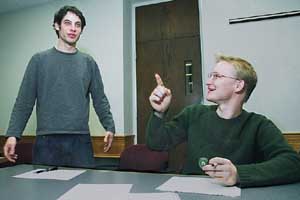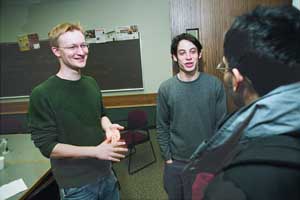This team enters ‘debating chambers,’ puts its Chicago critical thinking to test
By Josh SchonwaldNews Office
 Thane Rehn clocks Jake Steinberg in a practice run.  Thane Rehn (left) and Jake Steinberg (right) greet a member of the Parliamentary debate team who joins them for an evening of practice in Cobb Hall. |
Debating in Oxford University’s Union is like singing in Carnegie Hall or playing baseball at Wrigley Field. For debaters, the Union, its walls plastered with portraits of legendary orators, its rooms named “debating chambers,” is hallowed space. Earlier this fall, eight students in the College, members of the Chicago Debate Society, made a trip to the debate world’s Mecca.
The team, though, did not travel several thousand miles for a mere sightseeing adventure this past October; they went to Oxford for the chance to compete against the world’s best parliamentary debaters, said fourth-year Thane Rehn, President of the Chicago Debate Society.
Prodded by team adviser Nirav Shah, a student in the Pritzker School of Medicine and a former Rhodes scholar who had already debated at Oxford-and who, said Rehn, “kept telling us, if you don’t debate internationally, there’s no point in having a team”- Chicago sent a team to Oxford’s annual international tournament for the first time.
The tourney, which attracted undergraduate and graduate teams from more than 100 universities around the world, is one of the two most important events in collegiate debate, Rehn said.
And indeed, he said, the hype did not disappoint. “It was some of the best debate, best public speaking, I’ve ever heard,” said Rehn. Though admittedly impressed by the skill of some of the debaters and the surroundings, where the likes of Winston Churchill, Ronald Reagan and Yasser Arafat have spoken, the College debaters were clearly not intimidated. Chicago was one of only two American schools to advance a team into the competition’s final rounds. And although Rehn and his fourth-year teammate Jake Steinberg eventually lost to Middle Temple, a London law school, Rehn’s individual performance earned him ninth place in the speaker rankings and the tournament’s “best international speaker” honor.
While the performance of Chicago debaters at Oxford-a non-British team has never won the competition-may have surprised some Brits, it should come as no surprise to American parliamentary debate teams. During the past year, Chicago has emerged as a national powerhouse in intercollegiate parliamentary debate. Over the past year, the team of Steinberg and Rehn has consistently vied with a Princeton duo in the finals of some of the nation’s top intercollegiate tournaments.
A lesser-known and less-frequently practiced style of debate in the United States, parliamentary debate, which is designed to simulate a debate in the House of Parliament, pits two two-person teams (government vs. opposition) against each other in a contest of argument, wit and oratory. Unlike policy debate, which is far more common in United States high schools, and which emphasizes the preparation of evidence around key issues, parliamentary debate emphasizes extemporaneous thinking.
Participants have no idea what subject will be engaged in the debate, and it also requires a breadth of knowledge-questions could range from history to current events to literature, and team members have no idea what side of the issue they will be arguing. They could, for instance, argue for the World Trade Organization, against a particular presidential candidate’s education policy or even about whether the main character in Aldous Huxley’s Brave New World “should go to the island or not?”
While the team’s Sunday and Wednesday night practices now regularly attract more than 50 members, it was not always this way, Rehn said. When Rehn, a top policy debater as a high school student in Monterey, Calif., came to Chicago looking to link up with a debate club, he found a club that was barely active.
During his first year in fact, the team, which Rehn recalled had only one active member, was so pitiful that some promising young debaters, who had been high school debate stars, decided not to get involved, believing success was a long shot.
Nevertheless, a group of first-years, including Rehn and Steinberg, formed an active nucleus and were given the opportunity and resources to compete frequently. The team improved and continued to grow over the next two years, recruiting members at student events. During the academic year, parliamentary debate tournaments are held nearly weekly, often on the East Coast where this debate style is more common.
Rehn said he is not surprised that parliamentary debate is thriving at Chicago. In the 1970s, Chicago was considered the nation’s best team, hosting the first two national tournaments. What is more, with its emphasis on critical thinking and the quest for knowledge, Rehn said, “this school is conducive to the debate mentality. There’s clearly a natural market.”
Though some team members such as Rehn (a former state and national competitor) are former high school debaters, many other team members have had no previous debate or even forensics experience. Steinberg, for one, who is now among the country’s top collegiate debaters, had never debated before his first year at Chicago. “There was definitely a learning curve,” said Steinberg, who added that during his first year he struggled to put together concise arguments, maintain the fluidity of speech and was badly beaten by more experienced debaters.
Hooked on the activity, Steinberg persisted, and his development as a debater, he said, occurred almost entirely through practice and learning from more experienced Debate Society peers, such as Rehn. After each practice, the team holds a critique session where each pair is evaluated by an observer.
Both Rehn and Steinberg said the parliamentary debate augments their Chicago education, giving them a forum to hone their critical thinking skills and test ideas, often from a radically different political and intellectual perspective.
“It’ll be hard to top this year,” said Rehn of the success of the program and strength of the team. But as both Rehn and Steinberg see their competitive career ending as they approach graduation, they are encouraged by the future of the program. “What’s beautiful about the past four years is that we’ve created a team community. People are excited to see good debate.”
As for a replay of Chicago’s first debate trip to Oxford, Rehn said, “I hope it becomes an annual tradition.”
Does Rehn think Chicago or other American teams will ever beat the Brits at their own game? “It’ll be tough,” he said. “For one, they have a slightly different style. They also have the advantage of a rich, hundreds-year-old debating tradition that makes the sport more appealing to a general audience (popular people on campus debate in Britain),” Rehn joked. And he added, with a smile, “People with British accents just sound better.”
![[Chronicle]](/images/sidebar_header_oct06.gif)